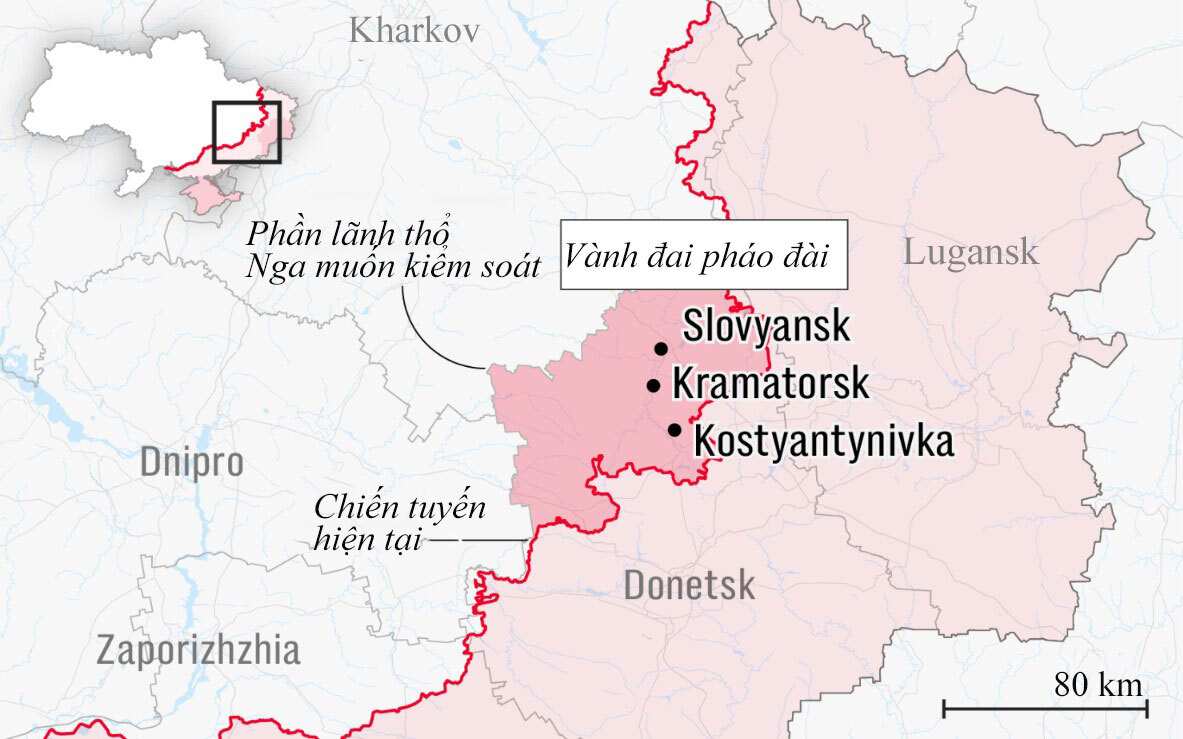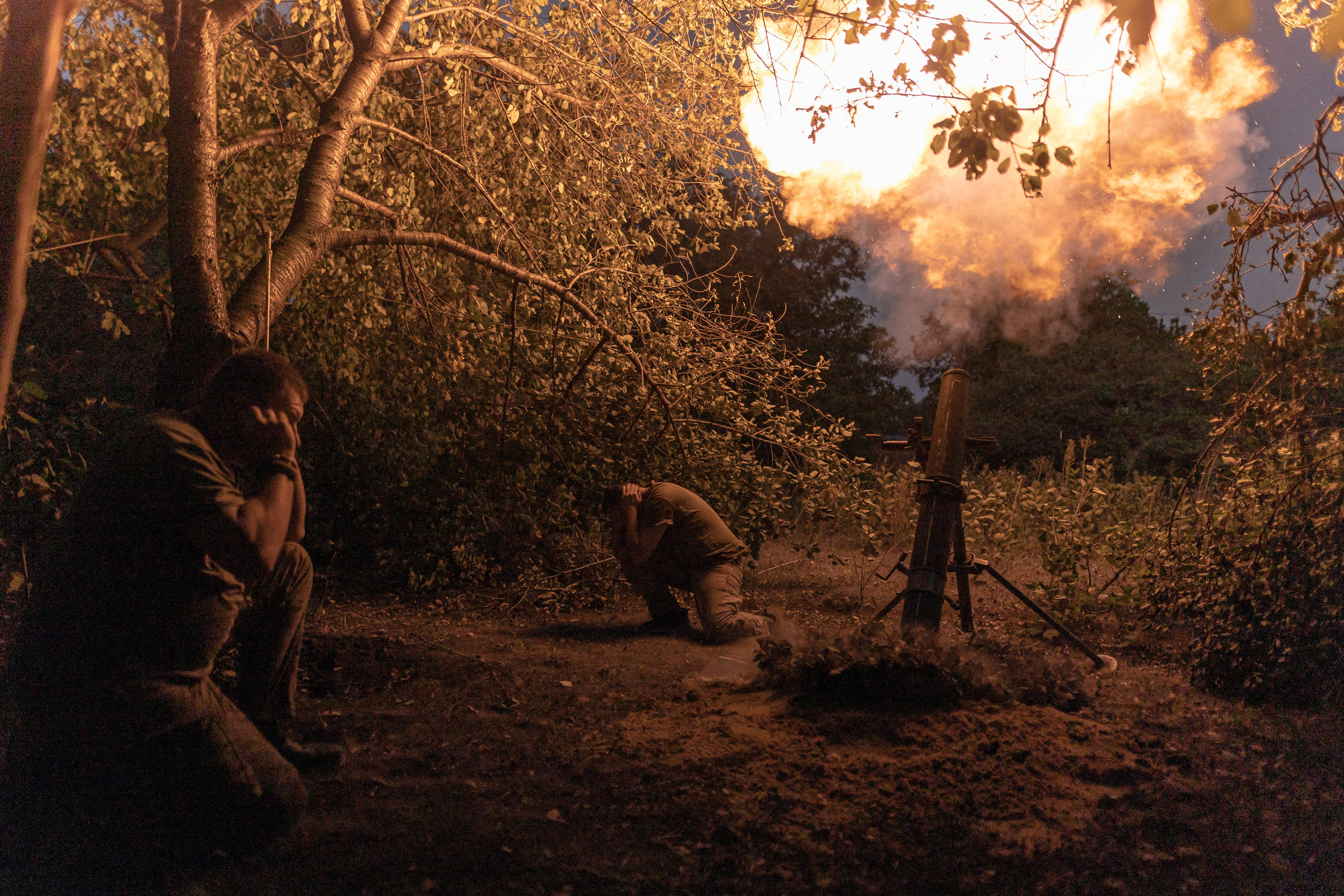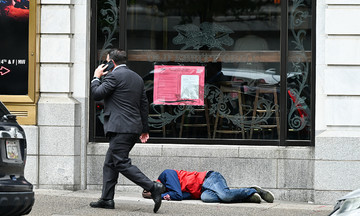At last week's Alaska summit with US leaders, Russian President Vladimir Putin reportedly proposed that Ukraine withdraw its troops from the areas it controls in Donetsk in exchange for a freeze along the rest of the front line.
Donetsk and Luhansk, the two provinces that make up the crucial industrial Donbas region in eastern Ukraine, are two of the four regions Russia claimed to have annexed in late 2022. Russia subsequently launched offensives to gain full control of Luhansk province, but has not been able to push Ukrainian forces out of about one-third of the territory they are defending in Donetsk province.
Russia currently controls 46,570 km2, or 88% of the Donbas region. The Ukrainian army still holds several key strongholds in Donetsk, such as the cities of Slovyansk, Kramatorsk, and Kostyantynivka, which form an important part of the "fortress belt" in the east blocking Russia's advance.
If Ukraine accepts Russia's proposal as a precondition for ending the conflict, it would have to completely abandon the Donbas region and push its "fortress belt" further west. However, President Volodymyr Zelensky has long rejected any idea of giving up Ukrainian-controlled territory, making Donbas a key sticking point in peace negotiations.
 |
Map of the Donbas region. Graphics: Telegraph |
Donbas is an abbreviation for "Donets Basin," but the area is actually a plateau. Its highest point is more than 300 m above sea level, and the terrain gradually slopes down, making it difficult to discern with the naked eye.
With its significantly higher terrain than the surrounding areas, Donbas is a region of strategic and military importance to both Russia and Ukraine. In recent years, the Ukrainian army has built defenses on the high ground in western Donetsk, where defending forces can easily spot approaching enemies and artillery fire is more effective.
Telegraph commentator Roland Oliphant described this terrain as a "barrier" protecting central Ukraine and serving as a solid anchor for the entire current front line. Oliphant believes that if the entire Donbas region is lost or ceded, Ukrainian forces will have to retreat to the lower steppe region, where the terrain is more open and difficult to defend.
Meanwhile, the Russian army will gain a very important strategic position, potentially controlling central Ukraine or creating a springboard to encircle Ukrainian forces in both Kharkiv to the north and Zaporizhzhia to the south. Holding the front line or even defending the rest of the country will then become especially difficult for Ukraine.
In addition, the port city of Mariupol in Donetsk province is also of great strategic value to Russia, as it provides access to the Black Sea and guards the land corridor from eastern Ukraine to the Crimean peninsula, which Moscow annexed in 2014.
Infrastructure is another important factor driving Russia's desire to capture Donbas. When Kyiv lost control of the Donetsk capital to pro-Russian separatists in 2014, they faced a major disadvantage, as the most modern and defensible infrastructure clusters between the Russian border and the central city of Dnipro fell into enemy hands. The Ukrainian army then only controlled the surrounding villages, which depended on the large city of Donetsk for economic development.
The chain of cities in the Donetsk region, including Kostiantynivka, Druzhkivka, Kramatorsk, and Sloviansk, has railways and highways running through them, connecting to Kharkiv and Kyiv, facilitating logistics, supply, and medical treatment. Since the outbreak of the conflict, these cities have played an even more important role.
Kostiantynivka is the logistical hub supporting Bakhmut, Chasiv Yar, and Toretsk against Russian attacks. Further north, Sloviansk and Kramatorsk serve as bases for the battles around Lyman, Izium, and the ongoing fighting in Siversk. If these cities fall, Ukraine will not only lose its defenses and favorable terrain but also its urban infrastructure and logistics, which help maintain the army and defense system.
Potential defensive bases such as Izium and Barvinkove in the Kharkiv region and Petropavlivka in Dnipropetrovsk will also be vulnerable if Donetsk falls to Russian forces.
Another factor pushing Russia to seize the Donbas region is its economic value. Mark F. Cancian, a senior advisor at the International Strategic Studies Center’s Defense and Security Department, said Donbas has been highly industrialized since the mid-20th century.
It is also an area with large coal reserves and many other valuable mineral resources. The agricultural land in Donbas is considered "some of the best in the world," Cancian said.
In addition to the above reasons, Donbas is also known as a region with a large Russian-speaking population. Many of them migrated to Ukraine from the Soviet era.
President Putin has repeatedly mentioned the goal of eliminating the "root causes" of the conflict. One of the reasons Russia launched the 2022 war was to protect the Russian-speaking community in the Donbas region.
"Donbas is symbolically important to Russia in explaining why the conflict occurred," said Erik Herron, a political scientist at West Virginia University in the US. "Russia has made numerous allegations about the Ukrainian government discriminating against Russian speakers there."
 |
Ukrainian soldiers fire a mortar in the Donetsk region on 17/8/2024. Photo: AFP |
Russia also argues that Russian speakers in Donbas want to be part of Russia. However, many experts find this argument unconvincing.
"A lot of people in eastern Ukraine, including ethnic Ukrainians, spoke Russian as their first language. One of them is Volodymyr Zelensky," said Steven Pifer, a former US ambassador to Ukraine and now a senior fellow at the Brookings Institution.
The Ukrainian government's firm stance is not to relinquish sovereignty over the Donbas region, even though they may not control the territory, a view widely supported by the public.
"Any agreement on territory concerns not only the land but also the people who live on that land. Many Ukrainians do not support being under Russian control," Herron said.
Zelensky's call for a ceasefire means accepting Russia's continued control of the areas of Donbas that its army holds, but Kyiv has not formally relinquished sovereignty over the territory.
"Ukrainians might accept an agreement based on the situation on the ground, but not cede sovereignty," Cancian said.
Thuy Lam (According to Telegraph, Al Jazeera, Guardian)












